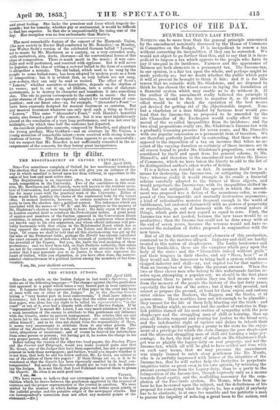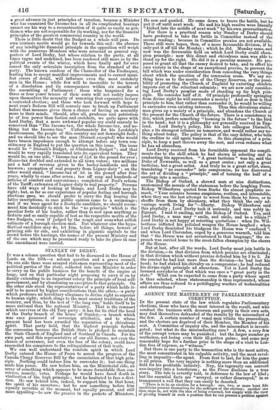TOPICS OF THE DAY.
BITLWEE, LYTTON'S LAST FICTION.
NOTHUG can be more true than the general principle announced by the amendment nominally discussed by the House of Commons in Committee on the Budget. It is inexpedient to renew a tax without correcting its inequalities, if they can be corrected. We would not object to go farther than this, and to say that it is inex- pedient to impose a tax which appears to the people who have to pay it unequal in its incidence. Fairness and the appearance of fairness are both elements in a permanent tax. The Income-tax, in our opinion, is a fair tax upon the whole, and perhaps might be made perfectly so; but we doubt whether the public which pays it will at present be brought to think it fair; and it is for this reason that we coincide with Mr. Gladstone, and are disposed to think he has chosen the wisest course in laying the foundation of a financial system which may enable us to do without it. If the author of the amendment really believed the principle it involves, he would be the first to negative it, as its practical effect would be to check the operation of the best means yet devised for getting rid of the objectionable impost. None but a charlatan or a man blinded by factious heat would pre- tend that the Income-tax as proposed to be amended by the late Chancellor of the Exchequer would really effect the re- moval of the so-called inequalities from its incidence; and the two rival propositions really are Mr. Gladstone's Income-tax with a gradually lessening pressure for seven years, and Mr. Disraeli's with one popular concession as a permanent item of taxation. We are therefore perfectly justified in contending, that those who are opposed to the imposition of a tax on incomes that takes no ac- count of the varying duration or certainty of those incomes, are in all reason bound to prefer Mr. Gladstone's proposition even when considered by itself and apart from his general scheme to Mr. Disraeli's, and therefore to the amendment now before the House of Commons, which we have taken the liberty to add to the list of its distinguished author's other works of fiction. It is a fiction not founded on fact. It assumes itself to be a means for destroying the Income-tax, or mitigating its inequali- ties; whereas really it would strangle in its cradle a financial scheme carefully adapted to the former of these objects, and would perpetuate the Income-tax, with its inequalities shifted in- deed, but not mitigated. And the speech in which the amend- ment was proposed was a fiction of the monstrous order, as com- posed of two incompatible and mutually destructive arguments; a kind of ratiocinative monster frequent enough in the world of babblement, but endowed fortunately with no powers of perpetuity or reproduction, as out of harmony with the eternal nature of things, which gods and men regard as equal to zero. First, the Income-tax was not needed, because the new taxes would be so productive ; then the Income-tax could not be done away with at the end of seven years because the revenue would not have re- covered the reduction Of duties proposed in conjunction with the new taxes.
But of all the fictitious and unreal elements of this production, commend us to the motives alleged. Industry and skill are hardly treated in this nation of shopkeepers. The lordly landowner and the lazy fundholder, these are the vampires which prey upon the body of the state : and the " Disraelites indeed without guile put their tongues in their cheeks, and cry "Hear, hear as if they would not like tomorrow to bring back a system which more clogged industry and skill—ay, and capital too for that matter— than an income-tax of five times the present amount. When the two or three clever men who belong to this unfortunate faction re- solve upon attempting a popular cry, we should in the first place recommend them to pause unless they can find means to erase from the memory of the people the history of the last forty years, especially the last ten of the series ; but if they will proceed, and cannot so prepare the ground, at least let them enjoin and enforce strict silence on the Bookers, the Bagges, and the Bucks, et id genus omne. These worthies have not wit enough to be plausible; they cannot for the life of them help blurting out the truth : and so on Monday night, no sooner had the author of varieties in Eng- lish politics turned off his neat oration of sympathy with the poor shopkeeper and the struggling man of skill or learning, than up rises all Bceotia rampant and roaring for justice to the broad acre, and the indefeasible right of squires and dukes to inherit their princely estates without paying a penny to the state for the enjoy- ment of a privilege for which the state charges the poor shopkeeper and the aforesaid struggling man of skill and learning a large per-
centage. In fact, the real point of attack on Mr. Gladstone's Bud- get was so plainly the legacy-duty on real property, and not the
Income-tax, which all will be glad to have settled and done with
on such easy terms' that we may presume the amendment was simply framed to catch stray gentlemen like Mr. Muntz,
who is so awfully impressed with horror of the iniquities of the Income-tax, that he will rather help the Derbyites to perpetrate iniquities twice as great even in his own opinion, by retaining the present exemptions from the Legacy-duty, than be a party to the reimposition of the Income-tax, though expressly only as a means towards fiscal equity, and the scaffolding necessary for the com- pletion of the tree-trade system. Mr. Hume, who from the la- hour he has bestowed upon the subject, and the definiteness of his proposal for remedying what he objects to, has a right if anybody has to be obstinate, is at once too sensible and too patriotic a man to pursue the impolicy of refusing a great boon to the nation, and
a great advanoe in just principles of taxation, because a Minister who has examined the Income-tax in all its complicated bearings cannot see his way to a reconstruction of it quite as easily as gen- tlemen who are not responsible for its working, nor for the financial principles of the greatest commercial country in the world. There is little doubt that the Budget as a whole will pass. Its own intrinsic merits would go far towards this end : the absence of any intelligible financial principle in the opposition will weigh with the numerous Members who were returned as general sup- porters of Lord Derby, but whose relation to the party, at all times vague and undefined, has been rendered still more so by the political events of the winter, which have finally and for ever erased the only articulate inscription from the standard of the party. The known candour of the Chancellor of the Exchequer, leading him to accept manifest improvements and to correct mani- fest errors of detail, will influence even the most crotchety men in the House ; while few will be insensible to the terrors of a dissolution and its consequences within six months of the assembling of Parliament : those who bargained for a three or four years' tenure of their seats will not rashly impose upon themselves the necessity of renewing that expensive luxury a contested election; • and those who look forward with hope to next year's Reform Bill will scarcely care to break up Parliament before that measure gives them a chance of having an assembly more to their minds. Should, after all, prudence and patriotism be of less power than faction and crotchets, we quite agree with Lord Derby, that a more awkward popular cry could scarcely be conceived than "The Income-tax, the whole Income-tax and no- thing but the Income-tax." Unfortunately for his Income-tax, facetiousness, the people of this country are not downright fools ; and we should like to see the man (Disraeli excepted) who would have brazen impudence enough to attempt before any town con- stituency in England to put the question on this issue. The issue would be " Disraeli's Budget, or Gladstone's Budget "; and that would be very rapidly translated into its equivalent terms. They would be, on one side, "Income-tax of kid. in the pound for ever ; House-tax doubled and extended to all town voters ; two millions and a half of revenue given to the barley-landlords and the brewers ; exemption of real property from Legacy-duty "; on the other would stand, "Income-tax of 5d. in the pound after four years, wholly to cease after seven ; tax off soap and hundreds of articles of comfort and convenience ; completion of Peel's reform of the Tara; extension of Legacy-duty to real property." Persons have odd ways of looking at things, and Lord Derby may be right ; but, as far as our experience of popular feeling and borough elections goes, we should prefer to carry the flag bearing the latter inscriptions, in case public opinion came to a scrimmage ; and if we were agent for a Derbyite candidate, we should recom- mend him decidedly to stick to the "no principle "which is the peculiar forte of his leader, rather than to rest upon anything so definite and so easily capable of test as the respective merits of the two Budgets, even if judged by the rough and somewhat selfish estimate of a borough election mob. But whatever else the hypo- thetical candidate may do, let him, before all things, beware of printing side by side, and exhibiting in gigantic capitals to the crowd before the hustings, the names of the present Ministry and of the one which may be presumed ready to take its place in case the amendment were carried.



























 Previous page
Previous page